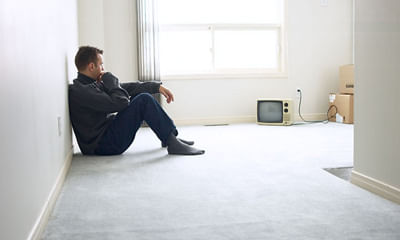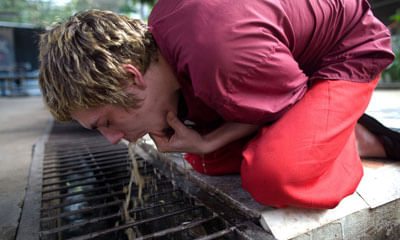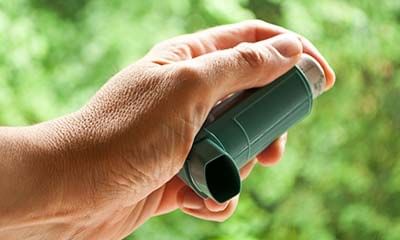Heavy Breathing During Pregnancy
I am 38 years old and 6 months pregnant. Since 15 days I am having anxiety issues. And I am not able to sleep since 10 d ...
Ask Free Question
You definitely need to deal with the anxiety. Why has it come now? Pregnancy can be stressful for some. Please see as counselor and attend tot he anxiety, which is exaggerated fear. Anxiety has all to do with fear and your inability (or so you would tend to think) to handle the same. Fear is based on looking too much into the future and imagining things that usually do not tend to happen (usually 90% of your fears will not happen). You need to change your perception of the fearful stimulus then you can change your response to the fear. The first one is the best and will preempt the need for the second. If you are already far gone into the reaction mode, then you need both responses to counter the attack. The way we see things in life (like half empty or half full glass) is very dependent on our attitude. Attitude may have developed over many years but fortunately can change in a matter of sustained choices made and acted up on now. Sometimes, fear may have originated in childhood and your body, more than you brain, remembers the emotion and will react with heightened fear even for the slightest provocation or stimulus. Sometimes, you may not even need a stimulus! these matters can ideally be resolved in therapy only, and exclusively. Accordingly, you choose to see things as either threatening or as an opportunity. The opportunist will be positive and work with the situation to make good out of it. The individual who sees it as threatening, will, out of fear, try to avoid/run away from the situation or react with anxiety. Yes, self-belief does impact it too, but you can see that prior to that, perception will tarnish the belief system too. Here, you can see that all the resolution lies in just changing your perception/attitude, even if it is against odds. Changing your response, despite the perception, is building up of your reserves and resources to handle any contingency that life throws up at you. And life throws up situations quite regularly and heavily. For this you need to develop a fit mind and body: the former, by meditation and mind exercises; and the later, by exercises and proper diet. You need good sleep too. Included in the development of the mind is the handling of emotions, in your case, fear. These changes will give you a handle on life and your perceptions and responses. Prayer is really powerful, if you are a spiritual person. Repeat some personally framed affirmations that are geared to calming you down and building confidence. Do a personality development course too. Anything that develops you personally will be of great assistance in building resilience. The lack of sleep, i.e. Sleep for less than 6 hours per night, is directly linked to about 86 diseases! so let us first focus on that. In your case particularly, do not sleep during the day; don’t even lie down. Go for regular exercise (breathing through your nostrils only) at a fixed time (at about 6 am) every day, whether you sleep or not. You must develop this habit of sleeping by 10 pm latest every night and wake up at a uniform time by 6 am every morning, even if you do not get sleep. If you do not get sleep, just lie down and if you have a bed lamp (or you could get one) lie down and read something light but not exciting. Your eyes will tire and you will fall asleep. If you like you may also put on light and soft music with the sleep function on. Depending on whether you are a visual or auditory person, you may watch tv in a lying down position until you feel sleepy. Have a warm bath before going to bed (for some people a cold bath at night seems to induce sleep! if you are one of them, please do so). Place the head side of your bed in a north-south position. The room must be as dark as possible and there should be no electronic items that give off even a light led glow. There must be ample ventilation in the room. Avoid strong odors, except lavender, on your body or in the room, or on your sheets and clothes. There should not be any live plants in your bedroom. Sleep with the lightest of clothes or without any clothing. When lying down to sleep, lie down on your left ear as much as possible. Do not sleep directly under an overhead fan. You must eat a good breakfast, a fairly light lunch, and an early dinner, which should be a very light meal. Whatever you eat in the other meals, have only a pure carbohydrate meal at night with any vegetables, and preferably before 8 pm. Do not drink much liquids after or near about dinner time. If you know emotional freedom technique or eft (check this out either on youtube or google), then please practice this too for sleep induction. Self-hypnosis and slow relaxation techniques, at night will be tremendously useful. Acupuncture or acupressure will both be very useful too. You can also try the 4-7-8 breathing pattern, which is to breathe in for four counts, hold your breath for 7 counts and exhale with a whoosh sound for 8 counts. This is to be done four times at a time first thing in the morning and last thing at night, and any number of times during the day. While doing this exercise place the tip of your tongue on the roof of your mouth. The effects will be seen after a few days. Pray last thing at night before you sleep.
I am pregnant 3 months. I am feeling heavy on left side of my stomach might and morning sometimes. My breath is heavy if ...
Ask Free Question
Yes, it's safe. In fact, it's unsafe not to take thyroid medication during pregnancy if you need it. Whether you have hypothyroidism (an underactive thyroid) or the much less common hyperthyroidism (an overactive thyroid), you'll probably need to take medication and be closely monitored by your doctor/ endocrinologist.
Sir or mam 2 moths ki prgnncy 4 misoprostol ki tab toung k nichy use ki 2 br. Bleeding 10va din heavy or painfull horhi ...
Ask Free Question
Medical termination of pregnancy strictly done at a direct of the supervision and hence since your breathing and having heavy pain kindly visit a doctor as soon as possible.
My wife and I are married for 3 months and we are trying for baby. Her periods date is 2nd of march but she received a l ...
Ask Free Question
Either blood test serum hcg-beta now or wait till period is missed for sure then urine pregnancy test.
Hi I am 27 years old. I had sex with my bf on 28 dec in my ovulation period. After that I am feeling dizzy and vomit tir ...
Ask Free Question
Dear user you need to get few days of medication to resolve it however you seems to be tensed related to pregnancy for which you need to re-do pregtest for mental satisfaction.
Can a man take viagra for long time ed please me give suggestions ad it's for for health or not. ...
Ask Free Question
No. U should not. Do you suffer from high bp or dm. If so are they under control. Any stress there are exercises a man can carry out to reduce the effects of ed. The best way to treat erectile dysfunction without medication is by strengthening the pelvic floor muscles with kegel exercises. These are often associated with women looking to strengthen their pelvic area during pregnancy, but they can be effective for men looking to regain full function of the penis. Firstly, find the pelvic floor muscles. You can achieve this by stopping mid-stream two or three times the next time you urinate. The muscles you can feel working during this process are the pelvic floor muscles, and they will be the focus of kegel exercises. One kegel exercise consists of tightening and holding these muscles for 5 seconds and then releasing them. Try to do between 10 and 20 repetitions each day. This may not be possible when you first start doing the exercises. However, they should become easier over time. You should be able to notice an improvement after 6 weeks. Make sure you are breathing naturally throughout this process and avoid pushing down as if you are forcing urination. Instead, bring the muscles together in a squeezing motion. Aerobic exercise, such a jog or even a brisk walk, can also help the blood to circulate better and can help improve ed in men who have circulation issues.
I have problem of breathlessness I take inhaler rotacaps! can I overcome this problem? Or this would remain life long? ...
Ask Free Question
Asthma has become a common ailment these days because of rampant air pollution and stressful lifestyle. The quality of the air we breathe, the change in climate and dust allergy can easily bring in an asthmatic flare-up in some people. An asthma attack causes breathing difficulty. This happens as your bronchial tubes get inflamed and contract, thereby narrowing down the air passages. You feel your chest tightening up and experience shortness of breath with a wheezing sound. What triggers asthma flare-ups? There a number of potential triggers for mild to severe asthmatic attacks. By identifying and avoiding these triggering factors you can bring down the frequency of your asthmatic flare-ups notably. Look out for the following factors that may set off asthma: 1.Cold and flu: cold and flu infection spreads through coughing and sneezing from an infected person. A cold takes 2-4 days while flu takes 3-4 weeks to recover. These infections can potentially trigger the asthma attack by causing inflammation of the air passages. 2.Weather change: the changing weather conditions, cold air, humid climate and thunderstorms often trigger asthma flare-ups. Changes in temperature also aggravate asthma problem. Cold air is one of the most common reasons for asthma attacks in kids and adults alike. 3.Allergens: dust mites: dust mites in your carpets, rugs, pillows and bedding may trigger asthma as well. It is very difficult to kill dust mites. Make sure you use the vacuum cleaner to clear away dust from your beddings, carpets, pillows etc. And put them out in the sun often. Moulds: if you have indoor plants then they may trigger an asthma attack due to allergy flare-ups. This happens as they tend to form moulds that may trigger asthma. Pollens: indoor plants and garden areas may be a good thriving ground for pollens. Pollens are very fine particles. Insects and gusts of air may transport these allergens to your body through breath. Pet/animal dander and cockroaches: pets or animals with hair or furs like a dog, cat, bird or even mice may shed minuscule skin flecks that may cause irritation and trigger an asthmatic flare up. If you have cockroaches at home, then get pest control done. Their droppings may also trigger asthma flare up and you would have never guessed the real reason! 4.Work environment: if your office area is closed up and not well ventilated, has wood dust or smell of wood polish, wall paint fumes, chemicals etc. Then your asthma flare-up can set off easily. 5.Cigarette smoke: if you smoke or you are in a smoking zone like in a restaurant or a party, then the smoke can prompt an asthma flare-up. Even smoke from a bushfire may trigger it. 6. Air pollution: if you live, work or travel in an area where air pollution is high due to traffic or lack of greenery, then an asthma flare-up can occur frequently. 7.Strong smells: strong smells from flowers, mosquito repellents, incense sticks, varnish, paint, perfumed candles, deodorants or body perfumes can also trigger asthma. 8.Medication: certain medicines can also trigger asthma attack like blood pressure or steroidal medicines etc. Always ask your doctor before taking medicines. 9.Stress and emotional highs: if you have not taken a vacation in a long time, you are working late nights or have to do heavy physical or mental work, then it results in extreme stress. It may trigger an asthmatic flare up. Emotional highs like anger or excitement can also trigger a flare-up of asthma. 10.Exercise: exercising, jogging, swimming or running can also trigger asthmatic attack due to physical exertion. This happens because when you run or work out, then breathing becomes faster. This lets a lot of cold air enter your lungs in comparison to normal breath that is made warm by your nose. 11.Hormonal imbalance: anytime you are experiencing hormonal ups and downs, asthma flare-up can get triggered. For women menstrual cycle, pregnancy or menopause can trigger asthma in some cases. This is not very common though. 11.Foods: kapha aggravating foods can also trigger an asthmatic attack. Avoid rice, curd, high salt, sugar, lentils, strong tea, alcohol, pickles, sauces, processed foods to lower the risk of an asthma flare-up. Processed foods contain preservatives like sulphite foods that may trigger asthma. Find out the reasons that cause your asthma to flare up. Keep yourself active despite asthma by avoiding these triggering factors.
Sir my mother have asthma problem in five months I want to know that how many time it take to good for permanently. ...
Ask Free Question
Asthma has become a common ailment these days because of rampant air pollution and stressful lifestyle. The quality of the air we breathe, the change in climate and dust allergy can easily bring in an asthmatic flare up in some people. An asthma attack causes breathing difficulty. This happens as your bronchial tubes get inflamed and contract, thereby narrowing down the air passages. You feel your chest tightening up and experience shortness of breath with a wheezing sound. What triggers asthma flare-ups? There a number of potential triggers for mild to severe asthmatic attacks. By identifying and avoiding these triggering factors you can bring down the frequency of your asthmatic flare-ups notably. Look out for the following factors that may set off asthma: 1.Cold and flu: cold and flu infection spreads through coughing and sneezing from an infected person. A cold takes 2-4 days while flu takes 3-4 weeks to recover. These infections can potentially trigger the asthma attack by causing inflammation of the air passages. 2.Weather change: the changing weather conditions, cold air, humid climate and thunderstorms often trigger asthma flare-ups. Changes in temperature also aggravate asthma problem. Cold air is one of the most common reasons for asthma attacks in kids and adults alike. 3.Allergens: dust mites: dust mites in your carpets, rugs, pillows and bedding may trigger asthma as well. It is very difficult to kill dust mites. Make sure you use the vacuum cleaner to clear away dust from your beddings, carpets, pillows etc. And put them out in the sun often. Moulds: if you have indoor plants then they may trigger an asthma attack due to allergy flare-ups. This happens as they tend to form moulds that may trigger asthma. Pollens: indoor plants and garden areas may be a good thriving ground for pollens. Pollens are very fine particles. Insects and gusts of air may transport these allergens to your body through breath. Pet/animal dander and cockroaches: pets or animals with hair or furs like a dog, cat, bird or even mice may shed minuscule skin flecks that may cause irritation and trigger an asthmatic flare up. If you have cockroaches at home, then get pest control done. Their droppings may also trigger asthma flare up and you would have never guessed the real reason! 4.Work environment: if your office area is closed up and not well ventilated, has wood dust or smell of wood polish, wall paint fumes, chemicals etc. Then your asthma flare-up can set off easily. 5.Cigarette smoke: if you smoke or you are in a smoking zone like in a restaurant or a party, then the smoke can prompt an asthma flare-up. Even smoke from a bushfire may trigger it. 6. Air pollution: if you live, work or travel in an area where air pollution is high due to traffic or lack of greenery, then an asthma flare-up can occur frequently. 7.Strong smells: strong smells from flowers, mosquito repellents, incense sticks, varnish, paint, perfumed candles, deodorants or body perfumes can also trigger asthma. 8.Medication: certain medicines can also trigger asthma attack like blood pressure or steroidal medicines etc. Always ask your doctor before taking medicines. 9.Stress and emotional highs: if you have not taken a vacation in a long time, you are working late nights or have to do heavy physical or mental work, then it results in extreme stress. It may trigger an asthmatic flare up. Emotional highs like anger or excitement can also trigger a flare-up of asthma. 10.Exercise: exercising, jogging, swimming or running can also trigger asthmatic attack due to physical exertion. This happens because when you run or work out, then breathing becomes faster. This lets a lot of cold air enter your lungs in comparison to normal breath that is made warm by your nose. 11.Hormonal imbalance: anytime you are experiencing hormonal ups and downs, asthma flare-up can get triggered. For women menstrual cycle, pregnancy or menopause can trigger asthma in some cases. This is not very common though. 11.Foods: kapha aggravating foods can also trigger an asthmatic attack. Avoid rice, curd, high salt, sugar, lentils, strong tea, alcohol, pickles, sauces, processed foods to lower the risk of an asthma flare-up. Processed foods contain preservatives like sulphite foods that may trigger asthma. Find out the reasons that cause your asthma to flare up. Keep yourself active despite asthma by avoiding these triggering factors.
I am 24 years old female. I have asthmatic problem. Please tell me about this treatment price? ...
Ask Free Question
Asthma has become a common ailment these days because of rampant air pollution and stressful lifestyle. The quality of the air we breathe, the change in climate and dust allergy can easily bring in an asthmatic flare up in some people. An asthma attack causes breathing difficulty. This happens as your bronchial tubes get inflamed and contract, thereby narrowing down the air passages. You feel your chest tightening up and experience shortness of breath with a wheezing sound. What triggers asthma flare-ups? There a number of potential triggers for mild to severe asthmatic attacks. By identifying and avoiding these triggering factors you can bring down the frequency of your asthmatic flare-ups notably. Look out for the following factors that may set off asthma: 1.Cold and flu: cold and flu infection spreads through coughing and sneezing from an infected person. A cold takes 2-4 days while flu takes 3-4 weeks to recover. These infections can potentially trigger the asthma attack by causing inflammation of the air passages. 2.Weather change: the changing weather conditions, cold air, humid climate and thunderstorms often trigger asthma flare-ups. Changes in temperature also aggravate asthma problem. Cold air is one of the most common reasons for asthma attacks in kids and adults alike. 3.Allergens: dust mites: dust mites in your carpets, rugs, pillows and bedding may trigger asthma as well. It is very difficult to kill dust mites. Make sure you use the vacuum cleaner to clear away dust from your beddings, carpets, pillows etc. And put them out in the sun often. Moulds: if you have indoor plants then they may trigger an asthma attack due to allergy flare-ups. This happens as they tend to form moulds that may trigger asthma. Pollens: indoor plants and garden areas may be a good thriving ground for pollens. Pollens are very fine particles. Insects and gusts of air may transport these allergens to your body through breath. Pet/animal dander and cockroaches: pets or animals with hair or furs like a dog, cat, bird or even mice may shed minuscule skin flecks that may cause irritation and trigger an asthmatic flare up. If you have cockroaches at home, then get pest control done. Their droppings may also trigger asthma flare up and you would have never guessed the real reason! 4.Work environment: if your office area is closed up and not well ventilated, has wood dust or smell of wood polish, wall paint fumes, chemicals etc. Then your asthma flare-up can set off easily. 5.Cigarette smoke: if you smoke or you are in a smoking zone like in a restaurant or a party, then the smoke can prompt an asthma flare-up. Even smoke from a bushfire may trigger it. 6. Air pollution: if you live, work or travel in an area where air pollution is high due to traffic or lack of greenery, then an asthma flare-up can occur frequently. 7.Strong smells: strong smells from flowers, mosquito repellents, incense sticks, varnish, paint, perfumed candles, deodorants or body perfumes can also trigger asthma. 8.Medication: certain medicines can also trigger asthma attack like blood pressure or steroidal medicines etc. Always ask your doctor before taking medicines. 9.Stress and emotional highs: if you have not taken a vacation in a long time, you are working late nights or have to do heavy physical or mental work, then it results in extreme stress. It may trigger an asthmatic flare up. Emotional highs like anger or excitement can also trigger a flare-up of asthma. 10.Exercise: exercising, jogging, swimming or running can also trigger asthmatic attack due to physical exertion. This happens because when you run or work out, then breathing becomes faster. This lets a lot of cold air enter your lungs in comparison to normal breath that is made warm by your nose. 11.Hormonal imbalance: anytime you are experiencing hormonal ups and downs, asthma flare-up can get triggered. For women menstrual cycle, pregnancy or menopause can trigger asthma in some cases. This is not very common though. 11.Foods: kapha aggravating foods can also trigger an asthmatic attack. Avoid rice, curd, high salt, sugar, lentils, strong tea, alcohol, pickles, sauces, processed foods to lower the risk of an asthma flare-up. Processed foods contain preservatives like sulphite foods that may trigger asthma. Find out the reasons that cause your asthma to flare up. Keep yourself active despite asthma by avoiding these triggering factors.
I been diagnosed with the post partum cardiomyopathy treatment since two month was doing well, but from past 2-3 days I ...
Ask Free Question
Hi Lybrate User, Cardiomyopathy literally means heart muscle disease might cause during pregnancy, often. Your present breathing disorder is owing to gastric diosrder need dietery regulation to check gastric disorder. Take care.








